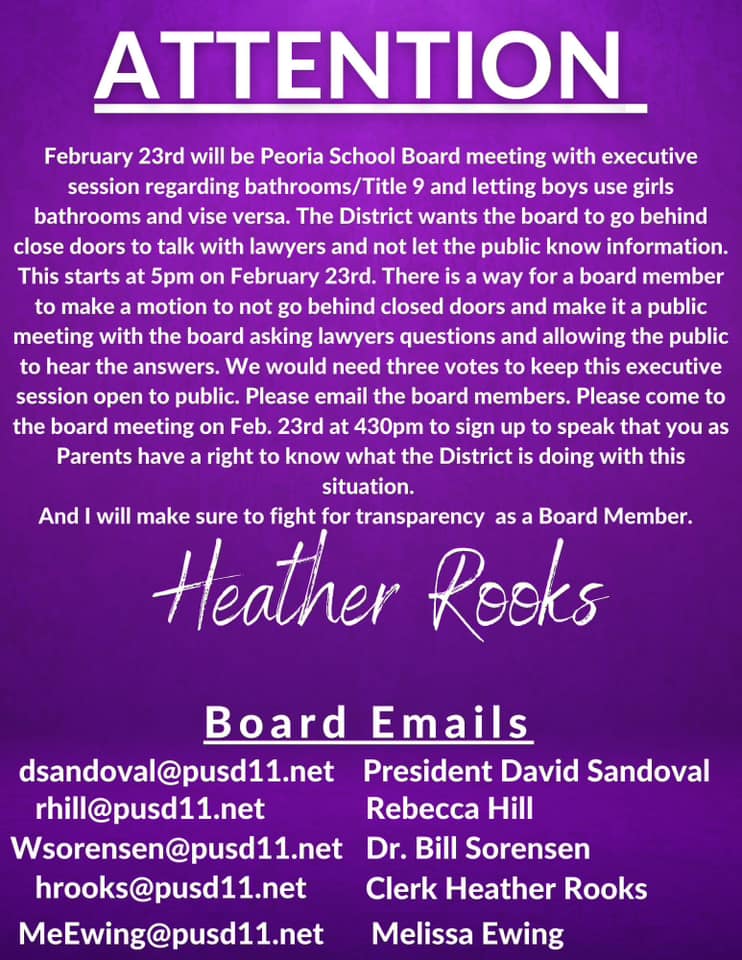Peoria Unified School District has sent out a reminder to the community, “the governing boards of Arizona’s public school districts are public bodies that are required to follow Arizona’s Open Meeting Law to conduct board business.” The reason? Recently elected board member, Heather Rooks, is calling for an executive session with the legal team to advise on Title IX regarding transgender students to be made public.
 Rooks, a long-time advocate of anti-transgender and LGBTQIA+ policies, states, “February 23rd will be Peoria School Board meeting with executive session regarding bathrooms/Title 9 [sic] and letting boys use girls bathrooms and vise [sic] versa. The District wants the board to go behind close [sic] doors to talk with lawyers and not let the public know information… There is a way for a board member to make a motion to not go behind closed doors and make it a public meeting with the board asking lawyers questions and allowing the public to hear the answers.”
Rooks, a long-time advocate of anti-transgender and LGBTQIA+ policies, states, “February 23rd will be Peoria School Board meeting with executive session regarding bathrooms/Title 9 [sic] and letting boys use girls bathrooms and vise [sic] versa. The District wants the board to go behind close [sic] doors to talk with lawyers and not let the public know information… There is a way for a board member to make a motion to not go behind closed doors and make it a public meeting with the board asking lawyers questions and allowing the public to hear the answers.”
What are Open Meeting Laws?
The Arizona Open Meeting Law is a set of rules that govern the conduct of public meetings in the state. These laws aim to ensure that meetings of public organizations, such as government agencies, boards, and committees, are open and accessible to the public. By promoting transparency and accountability in government decision-making, the open meeting laws play a crucial role in preserving the democratic principles of the state of Arizona.
The open meeting laws in Arizona apply to any meeting of a public body where a quorum of the members are present and where public business is discussed or formal action is taken. A “public body” includes any board, commission, committee, or council of a political subdivision of the state, such as a city council, school board, or county commission. The laws also apply to subcommittees, working groups, and other similar bodies created by a public body and empowered to take actions that are binding on the public body.
Under the open meeting laws, all meetings of public bodies must be held in a public place and be open to the public. This means that anyone who wants to attend a meeting can do so, and anyone who attends is entitled to observe the proceedings and listen to the discussions. The public also has the right to address the public body during the meeting, either during a public comment period or by speaking on specific agenda items.
Arizona Open Meeting Law promotes transparency and accountability in government decision-making. By requiring that meetings be open to the public and that notice of the meetings be given in advance, the laws ensure that citizens can understand how decisions are made and have a voice in the process. By providing for enforcement of the requirements, the laws also ensure that public bodies are held accountable for their actions and that the democratic principles of the state are preserved. However, there are exceptions for executive sessions, and for a good reason.
Executive Sessions
Executive sessions are an exception to the general requirement that public meetings be open to the public. In an executive session, a public body may close its meeting to discuss particular sensitive or confidential matters that cannot be discussed in an open meeting.
Under Arizona’s open meeting laws, a public body may hold an executive session to discuss a limited set of topics, including personnel matters, legal advice, and the purchase or sale of property. Executive sessions allow public bodies to close their meetings to discuss certain sensitive or confidential issues, but they must follow specific procedures and are meant to be used sparingly. Any action taken during an executive session must be taken in an open session so that the public can observe and understand the decision-making process. When discussing Title IX and transgender students, legal advice will be given by qualified legal teams (something they are unlikely to do in an open meeting), and any decision made must be voted on publicly.
Why won’t Lawyers Give Advice Publicly? Attorney-Client Privilege
Lawyers may not provide advice in an open session for a number of reasons. One of the main reasons is attorney-client privilege, which is a legal principle that protects the confidentiality of communications between a lawyer and a client. This privilege is important because it allows clients to communicate openly and honestly with their lawyers without fear that their confidential information will be disclosed to others.
In a public meeting, there may be situations where a public body seeks legal advice from its attorney. To maintain the confidentiality of this advice and to protect the attorney-client privilege, the public body may go into an executive session to discuss the matter with the attorney. A lawyer may not provide advice in an open session when the discussion may involve sensitive or confidential information. In the case of Title IX and topics related to students’ gender identity, this would also violate the Family Educational Rights and Privacy Act. In a discussion about bathroom usage, specific examples that could potentially identify a student may likely be used, violating their right to privacy and ultimately outing them as transgender.
In some cases, a lawyer may also not provide advice in an open session because the discussion may compromise the attorney’s ability to represent the public body effectively in future legal proceedings. For example, if the lawyer provides advice in an open session later used against the public body in court, the lawyer’s impartiality may be called into question.
Is Title IX Advice Always Given in Executive Session?
Attorney-client privilege and the need to maintain the confidentiality of sensitive or confidential information will almost always apply to discussions around Title IX. Title IX is a federal law prohibiting sex discrimination in education, and it can be a complex and sensitive issue for public schools and other educational institutions.
Discussions around Title IX can be complex and sensitive and may involve confidential or sensitive information. By going into executive sessions, public schools and other educational institutions can receive confidential legal advice and protect the attorney-client privilege while still following the procedures outlined in Arizona’s open meeting laws.
Should this Discussion be Open to the Public?
Based on the concepts of attorney-client privilege and the complexities of Title IX, no. Peoria Unified School District is morally and legally obligated to do everything it can to protect its students, families, and staff. Opening this meeting up to a potential violation of FERPA or causing the lawyer’s impartiality to be called into question could cost the district significant sums of money – and that’s before we even address Rooks’ desire to create policies that violate Title IX.
Rooks Wants to Ban Students from using Bathrooms that Match their Gender Identity
In her work with West Valley Parents Uniting, throughout her campaign and as a governing board member, Rooks has made it clear that she wants to ban transgender students from using bathrooms that match their gender identity. This desire stems from the political rhetoric that has spread a myth that gender-segregated restrooms are safer for cisgender girls than less restricted facilities.
The research is quite the opposite. There is no evidence that restricted facilities increase the safety of cisgender females. Yet, studies have found that these restrictions greatly increase the risk of sexual assault for transgender and non-binary students. A 2019 study by Harvard T. H. Chan School of Public Health discovered that transgender and non-binary students had a 25.9% risk of sexual assault compared to a 15% national rate of sexual assault in cisgender females, a 77% increase. Their final recommendation was that in addition to “avoiding restrictive policies, schools should strongly consider designating ‘all-gender restrooms,’ along with additional adult supervision in locations where harassment is most likely to occur, training staff to intervene in anti-LGBTQ bullying, and offering privacy options (eg, curtains) in locker rooms.”
Mrs. Rooks should not only learn more about Open Meeting Laws, executive sessions, and attorney-client privilege, but also attempt to educate herself on Title IX, LGBTQIA+, and human rights.



Recent Comments